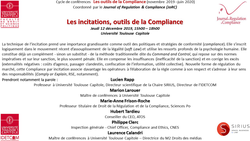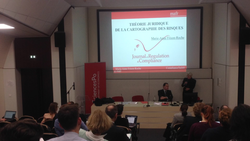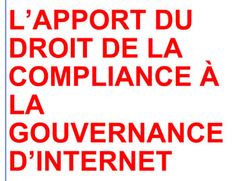Compliance and Regulation Law bilingual Dictionnary

Regulation has historically been built on the idea of a sector, for example telecommunications, energy, rail, banking, audiovisual etc. This was linked to the fact that the regulations were thought by Europe and more particularly the European Commission as a means of establishing effective competition in a process of liberalization of sectors.
But that was to think excessively about regulation over competition, that is, regulation as a means of building competition. In fact, regulation can be today, in a primary way, a means of preventing crises and managing risks, as well as a means of long-term management of goods and services that do not support the instantaneousness of markets, even led to competitive maturity.
However, in this second perspective, the risks are in no way confined to a sector. On the contrary, they move from one sector to another. Likewise, a good, over time, passes from one sector to another. Thus, the time has come to qualify the thought of regulation in relation to the sector and to conceive the regulation in relation to the movement of goods that do not only move in a flat way on markets but also in chains within which they develop, which supposes long-term planning (as in energy matters), and in which they carry risks with them, which confinement in a sector does not make it possible to manage.
Thus, the contamination of the banking risk inflamed the financial sector and the insurance sector in a manner as devastating as does a health risk ranging from the water sector to that of food, medicine, etc. the same way that data moves from the television sector to the telephone sector, to the digital sector.
Moreover, agriculture, whose regulation is still very poorly thought out, except for an old report on the “timber industry”, shows that the good goes from the purely agricultural sector to the food sales or pharmaceutical production sector, themselves. regulated without connection. The agricultural organizations spontaneously coordinated to integrate this reality of the chains.
If we better integrate this reality of the chains, which corresponds to the way in which risks spread, a major issue of regulation, a dimension that has nothing to do with competition, we would have to disconnect regulation from its strict link with the notion of sector, or at least, better organize interregulation.
Compliance and Regulation Law bilingual Dictionnary

The very term 'media' is ambiguous since in the literal sense it designates what makes it possible to convey information between two people, that is to say the container rather than the content. In fact, today the media designate the content, that is to say the information as well as the media on which it circulates.
If the media are regulated, it is above all for political purposes and in a different way depending on the medium. Indeed, if we take the audiovisual sector, it is above all a question of preserving public television stations from the temptation of political power to use its power as owner to use it as a propaganda tool and to ensure pluralism. politics during election campaigns. The regulator of these public freedoms is the CSA. The print media does not have a regulator per se; it is directly held at arm's length financially by the state through the Directorate of Media Development, attached to the Prime Minister. But today the major medium appears to be the Internet, a space for which global regulation remains to be found.
Finally, because it is not possible to distinguish between content and container, the dynamism of communication and the dynamism of content creation are inseparable. Therefore, the regulation of communication must eventually be associated with the regulation of content creation, that is to say, cultural regulation. In the United States, this is left to the market, where a film industry has notably been built, guided by the needs of applicants. France continues to defend the idea that culture and the audiovisual sector are not a neutral object of the market and should therefore be removed from the WTO, the regulation of culture, because it is a question of common good, to which everyone must have access, justifying the entire ex ante system of public aid for creation and the desire for cultural diversity.
Compliance and Regulation Law bilingual Dictionnary

The competition authority is generally an independent administrative authority (AAI). This is the case in France with the Autorité de la Concurrence (ADLC) which succeeded the Conseil de la Concurrence and which, like it, was designed to intervene ex post. Whatever the market considered, thus benefiting from almost universal jurisdiction over any economic activity of production, distribution and service, it can be seized or even self-seized when elements of anti-competitive behavior are alleged. The competition authority does not monitor the markets as such, nor does it build them or maintain their balance. These functions are precisely devolved to regulators. We can thus see that the competition authority has a much broader competence than that of the regulators, since the latter's office is limited to a sector while, conversely, the competition authority has a much weaker power than that of the regulators. regulators, since it has no ex ante powers and only intervenes on an ad hoc basis.
This distinction in no way precludes coordination between regulators and the competition authority, in particular because they can reciprocally transmit cases or information to each other, just as they can solicit each other for their respective opinions. The more competitively mature the sector for which a regulator is responsible, the more active this collaboration will be, as can be seen in telecommunications.
But things are not so simple, we will take two examples: first, the competition authorities, whether French (since the law on the modernization of the economy - LME of August 4, 2008 ) or European since the Community regulation of 1985, the competition authority operates merger control. This considerable function and power consists in assessing the conformity with the law of the will of two companies to come together (for example, by a merger). But, insofar as the competition authorities very often put conditions to accept the concentration, for example disposals of assets or behavioral commitments, we arrive at a kind of economic and industrial mechanic operated ex ante, comparable to a regulatory power. These commitments are in fact negotiated between companies and the Competition Authority: what are presented as unilateral conditions appear to be a kind of contract. More generally, the more the competition authority develops the technique of commitments, including with regard to anti-competitive practices, the more it contracts its behavior vis-à-vis companies, renouncing sanctions, that is to say abandoning its attitude ex post, to organize a new situation for the company adopted by it through its commitments, the competition authority then acting ex ante, behavior characteristic of a regulator.
Secondly, the European Commission, a multi-headed organization, on the one hand sanctions anti-competitive behavior and operates merger controls, and on the other hand, drafts the texts of the directives of the community regulations that the European Parliament and the European Council will adopt thereafter. However, in the regulated sectors, the European Commission adopts and writes dozens of directives and regulations to such an extent that it has become accustomed to designing them by “package”, apprehending developments in energy or regulation. environment, banking or telecommunications, etc., by packages containing several directives and regulations. In these texts, which therefore come under ex ante, the regulatory organizations of the sectors are deeply affected. This sort of Janus that the European Commission constitutes means that it is, at European level, both the Competition Authority and the Regulatory Authority. However, national competition authorities tend to claim that they are "small European commissions", which reinforces their tendency to want to regulate the economy. They come to propose in texts of “soft law” the concept of “competitive regulation”, which constitutes an oxymoron.
Compliance and Regulation Law bilingual Dictionnary

Control is a concept so central in Regulation that, in the difficult exercise of translation, the English term of "Regulation" or the expression "Regulatory system" are often translated, for example in French,, by the French word "control" (contrôle). Indeed, the Regulator controls the sector for which he is responsible. This control is carried out ex ante by the adoption of standards of behavior, whether the Regulator prohibits behavior or obliges the operators to do so. In addition, the Regulators exercises his control powers through the power to approve companies entering the sector or the power to certify certain types of products sold on the markets for which he is responsible. In addition, he continuously monitors the sectors for which he is responsible since his function is either to construct them to bring them to maturity or to remain in balance between the principle of competition and another concern, for example to ensure that they do not fall into a systemic crisis.
These ex ante controls radically distinguish the regulatory authority from the competition authority, which intervenes only ex post. Finally, the regulatory authority controls the sector in ex post: in this he works on a temporal continuum, sanctioning the failings he finds on the part of the operators to the prescriptions he has adopted himself. he often has the power to settle disputes if two operators compete in a dispute between them and bring it before him.
This control function specific of the regulatory authority, which it often shares with the traditional administration and which opposes it to the activity of the competition authority and the courts, is made difficult by its possible lack of independence. Indeed, because the Regulator is a State boddy, if the regulator has to control a public operator, it may risk being captured by the government, since the whole organization of the regulatory system must therefore ensure its independence not only statutory but also budgetary in relation to it. This risk of capture is permanent not only because of the government but also because of the sector. Secondly, control can be inefficient if the regulator lacks adequate, reliable and timely information, risk generated by information asymmetry.
To fight against this, according to the childish image of the stick and the carrot, we must at the same time give the regulator powers to extirpate information that the operators do not want to provide, the texts never ceasing to give regulators new powers, such as perquisitions power ou sanction ou settlemeent. Symmetrically, operators are encouraged to provide information to the market and the regulator, for example through leniency programs or the multiplication of information to be inserted in company documents. Finally, there is a difficult balance between the need to combat the capture of the regulator and the need to reduce the asymmetry of information since the best way for the latter to obtain information from the sector is by frequent attendance by operators: , This exchange that they accept very willingly is the open voice to the capture. It is therefore an art for the regulator to keep operators at a distance while obtaining from them information that only untended relationships allow him to obtain.
Moreover, the Compliance Law which is in the process of being put in place is intended to resolve this major difficulty, since the operator becomes the primary agent for the implementation of the Regulation Law, whose aims are internalized in the " crucial " and global operators perator, operator crucial and global, the Regulator ensuring the effective structural change of the operator to realize these goals of this Global Regulation Law.
Compliance and Regulation Law bilingual Dictionnary

The Federal Communications Commission (FCC) is the independent regulatory authority in the United States that regulates at the federal level both the container and the content of telecommunications.
In this, the United States differs from the European Union, a legal space in which most often the regulatory institutions of the container and the content are distinct (for example in France ARCEP / CSA / CNIL) and in which the regulations of communications remain substantially at the level of the Member States of the Union.
Like other audiovisual regulators, it ensures pluralism of information by limiting the concentration of capital - and therefore of power - in the television and radio sector. We can thus see that the American system is not in principle different from the European system.
In addition, the FCC is characterized first of all by a very great power, imposing at the same time substantial principles on the operators, like that of the "decency", going in the name of this principle until sanctioning television channels which had let show a bare breast of a woman. The control is therefore more substantial than in Europe, this control weighing against the constitutional freedom of expression which is more powerful in the United States than in Europe. It is true that today the leading digital companies tend to formulate for us what is beautiful, good and decent, in place of public authorities.
The FCC continued to develop the major principles of the public communication system, as in 2015 that of the Open Internet (Open Internet) or to formulate the principle of "digital neutrality", adopted by a federal law, this principle having considerable economic and political implications.
But at the same time, a general mark of American law, the judge moderates this power, according to the principle of Check and Balance. Thus the Supreme Court of the United States in FCC v. Pacifica Foundation in 1978 this power of direct control of the content but also operates the control of the control.
The election in 2016 of a new president who is, among other things, totally hostile to the very idea of Regulation is a test in the probative sense of the term. In January 2017, he appointed a new president of the FCC, hostile to any regulation and in particular to the principle of neutrality. The question which arises is to know if technically a regulation already established on these principles can resist, how and for how long, a political will violently and expressly contrary. And what will the judges do.
Compliance and Regulation Law bilingual Dictionnary

Le Fond Monétaire International (FMI), crée en 1945, a pour fonction historique d’intervenir pour aider les États en cas de crise financière grave. Par la technique de conditionnalité des prêts, le FMI a dépassé ce rôle de prêteur pour devenir une sorte de tuteur et imposer des réformes structurelles, notamment de libéralisation des économies dont les gouvernements lui demandaient une aide financière.
La crise financière de 2008 lui a donné une nouvelle importance car le Fonds apparait aujourd’hui comme le seul organe apte à intervenir en cas de crise financière et économique systémique mondiale, puisqu’il est le seul organe mondial. En cela il aurait vocation à être le nouveau et pour le moment seul régulateur économique et financier mondial. Reste à ce qu’il en ait les moyens financiers et à ce que les États acceptent cette dépossession de souveraineté.
Nov. 4, 2020
Teachings : Compliance Law

Résumé de la leçon.
Le "Droit de la Compliance" est encore si incertain dans ses bases que, suivant que l'on parle de tel ou tel sujet, on a tendance à le faire débuter à telle ou telle époque, signe que l'on ne le maîtrise encore pas dans son ensemble. Ainsi, lorsqu'on parle de corruption l'on le fera commencer souvent en 1977 par le FCPA américain, lorsqu'on parle en droit des sociétés l'on visera la loi Sarbanes-Oxley, lorsqu'on vise la protection des marchés financiers l'on vise la loi américaine de 1933, lorsqu'on vis le droit de la concurrence l'on vise plutôt les textes des années 1990 en Europe. Lorsqu'on vise la question des données, l'on vise l'arrêt Google Spain rendu par la Cour de Justice de l'Union européenne rendu en 2014. Quant à l'environnement, l'on a encore tendance à se projeter dans l'avenir ... Le fait qu'on vise tantôt les Etats-Unis et tantôt l'Europe, tantôt des lois et tantôt des jugements, montre que pour l'instant l'on ne dispose pas d'une vision globale.
Mais une notion est souvent présente, quelque soit le secteur ou le domaine (puisque par exemple le Droit du commerce international n'est pas sectoriel), est celle de "données". En même temps qu'est apparue la notion juridique de "donnée" est apparu la thématique de la "Compliance". La difficulté première vient du fait que si l'on reprend cette perspective des "données", l'on mesure assez rapidement que nous ne maîtrisons pas la définition juridique de la "donnée", soit information appropriée, ce qui suppose qu'elle soit un bien, soit information inappropriable, "bien public" propre au marché (comme en matière financière), soit une information qui implique un effet incompatible avec la notion de "bien", à savoir son caractère indétachable des êtres humains : les "données à caractère personnel".
Pour essayer de comprendre l'évolution future du Droit de la Compliance en matière de données, il faut reprendre l'historique, c'est-à-dire la jurisprudence européenne, qui utilse l'outil du Droit de la Compliance en bâtissant un Réglement, désormais mondialement célèbre, construit sur un droit subjectif inventé par la Cour de Justice, le "droit à l'oubli", lequel est lui-même la trace des législations françaises et allemandes qui elles-mêmes avaient souci de l'efficacité des "fichiers". La Seconde Guerre mondiale était présente dans les esprits et le but était de limite l'efficacité et non de l'accroître. Ce but d'inefficacité, qui est commun à la procédure pénale classique, rend difficile l'insertion de ce Droit de la Compliance-là avec le Droit général de la Compliance dont le but est l'efficacité.
Se reporter à la Présentation générale du Cours de Droit de la Compliance.
Consulter le Dictionnaire bilingue du Droit de la Régulation et de la Compliance.
Consulter la Bibliographie générale du Cours de Droit de la Compliance
Consulter la bibliographie ci-dessous, spécifique à cette Leçon au Droit de la Compliance relatif aux "données"
Oct. 21, 2020
Teachings : Generall Regulatory law

Résumé de la leçon.
Jadis, la Régulation fonctionnait selon un système qui avait le mérite d'être simple, puisqu'il était construit sur une hiérarchie.
Dans le système désormais en place, les pouvoirs s'ajustent entre les institutions politiques et les régulateurs. Mais le jeu ne se limite pas à cela. Les juges sont omniprésents, non seulement comme instruments de contrôle mais encore, voire surtout, comme modèles.
En outre et dès lors, les entreprises ont du mal à trouver leur place. Elles semblent aux deux extrêmes. Ayant quitté celle d'assujetti, elles briguent grâce à l'autorégulation une place très privilégiée. Mais la compliance est la nouvelle donne de la régulation, via la supervision, étant le cœur d'un système où les entreprises sont à la fois débitrices et garantes de l'effectivité des règles de régulation.
L'émergence d'un Droit de la Compliance, qui prolonge le Droit de la Régulation, voire l'amplifie et le transforme en le libérant de ce qui le fît naître, c'est-à-dire le fait même d'un "secteur", est en train de renouveler complètement le rôle de chacun.
___
- Se reporter aux slides.
- Se reporter à la présentation générale du Cours de Droit commun de la Régulation.
- Consulter le Dictionnaire bilingue du Droit de la Régulation et de la Compliance et la Newsletter MAFR - Law, Compliance, Regulation
- Consulter la bibliographie ci-dessous, spécifique à cette Leçon relative à la place de chacun dans le Droit de la Régulation.
Oct. 14, 2020
Teachings : Compliance Law

Résumé de la leçon.
Le Droit de la Compliance semble être synonyme d"extraterritorialité, en ce qu'il se fit connaître d'une façon spectaculaire en 2014 par la décision américaine sanctionnant la banque française BNPP. L'on a dès lors souvent assimilé "Compliance" et extraterritorialité du Droit américain, englobant les deux dans la même opprobre.Celle-ci est par exemple d'une grande violence dans le rapport dit "Gauvain" de 2019. Mais sauf à croire que le Droit n'est que l'instrument pur du Politique, en raison des "buts monumentaux" poursuivis par le Droit de la Compliance, celui-ci ne peut avoir en tant qu'instrument qu'une portée extraterritoriale, sauf à être utilisé par une Autorité locale pour ne servir qu'un but local. Dans cette hypothèse, précise et restreinte, l'extraterritorialité du Droit de la Compliance doit être combattue, ce qui est fait par la Cour de la Haye dans sa jurisprudence de 2018. Mais pour résoudre cette question particulière, l'on risque de détruire l'idée même de Droit de la Compliance, lequel suppose l'extraterritorialité. Et au moment même où le continent asiatique est en train d'utiliser le Droit de la Compliance dans une définition mécanique pour mieux s'isoler.
Si l'on prend les autres sujets sur lesquels porte le Droit de la Compliance, lequel excède la question des embargos, l'on peut même soutenir qu'il a été fait pour ne pas être brider par les territoires, lesquels sont à la fois l'ancrage des Etats et leur intrinsèque faiblesse. L'internalisation dans les entreprises permet cela. Elle le permet tout d'abord par le mécanisme de "l'autorégulation". En effet, si l'on fait un lien, voire une identification entre la Compliance, l'éthique et l'autorégulation, alors la question des frontières ne se pose plus. Ainsi, l'entreprise s'auto-instituant non seulement comme un "néo-constituant" mais comme un ordre juridique complet, y compris dans le règlement des différents et dans les voies d'exécution (enforcement par le bannissement). La question de l'efficacité est donc réglée mais ouvre alors celle de la légitimité. C'est pourquoi l'Europe a vocation à porter une conception extraterritoriale d'une définition pourtant européenne de ce qu'est le Droit de la Compliance. C'est ce à quoi les arrêts de la Cour de justice de l'Union européenne du 24 septembre 2019 viennent de mettre un coup d'arrêt.
Se reporter à la Présentation générale du Cours de Droit de la Compliance.
Consulter le Dictionnaire bilingue du Droit de la Régulation et de la Compliance et la Newsletter MAFR - Law, Compliance, Regulation.
Consulter la Bibliographie générale du Cours de Droit de la Compliance
Consulter la bibliographie ci-dessous, spécifique à cette Leçon relative aux enjeux pratiques du Droit de la Compliance
Sept. 16, 2020
Teachings : Compliance Law

Consulter le Dictionnaire bilingue du Droit de la Régulation et de la Compliance (v. ci-dessous des entrées plus précises)
Consulter dans la Newsletter MAFR - Law, Compliance, Regulation ce qui est plus particulièrement afférent à la définition de la Compliance (v. ci-dessous des articles plus précis)
_____
Consulter la Bibliographie générale du Cours de Droit de la Compliance
Consulter la bibliographie ci-dessous, spécifique à cette Leçon relative à la définition de la Compliance et du Droit de la Compliance.
Résumé de la leçon. L'exercice de définition n'est en rien théorique. Surtout pas concernant la Compliance, relevant d'une terminologie anglaise ce qui semble compliquer encore les choses mais il faut au contraire partir de là, à savoir le fossé qui semble exister entre le mot "Compliance" et le mot "Conformité". Il apparaît en premier lieu que celui-ci comporte une dimension mécanique que le premier ne comporte pas de prime abord. Cela renvoie à des effets techniques et à une conception, qui convie dès lors à des algorithmes la prise en charge de ces sujets. Une des questions est alors la responsabilité et le sort des êtres humains. L'enjeu disciplinaire apparaît en second lieu, car l'idée que la Compliance relève du Droit ne s'impose pas. En outre, si on ramène la Compliance vers le Droit, de quelle branche du Droit relève-t-il, ce qui implique des compétences juridictionnelles et substantielles ? Sauf à dire qu'il pourrait constituer une branche du Droit autonome... Presque tous y sont réticents. Pourtant, c'est bien vers cela que non seulement nous allons mais vers cela que nous devons aller.
____
Consulter les slides servant de support à la Leçon
Se reporter à la Présentation générale du Cours de Droit de la Compliance.
Consulter la Bibliographie générale du Cours de Droit de la Compliance
Consulter la bibliographie ci-dessous, spécifique à cette Leçon relative aux enjeux pratiques du Droit de la Compliance

March 22, 2020
Publications

This working paper is the basis for an article in the French Law Journal Le Clunet.
When we compare the terms "Compliance" and "Extraterritoriality", it is often with dissatisfaction, even anger and indignation. On the momentum, after having expressed a principle of disapproval of such a merger, attention is focused on how we can fight against it, to break the link between Compliance and Extraterritoriality. But do we have to go so fast? Is this negative initial assessment correct?
Indeed, thus gone, it is frequently explained that the binding mechanisms of Compliance are suffered, that they come from abroad!footnote-1750, that they apply with efficiency but in an illegitimate way, without agreement of the one who must submit to it, whose resistance is therefore certainly ineffective but nevertheless justified. In the same spirit, when we start to shell the cases, like so many scars, sort of rosary, even crown of thorns, BNPP case!footnote-1718, Astom case!footnote-1717, etc., the wounds not yet closed turn into reproaches made against the rules, public authorities, even reproaches made against named people.
We are leaving this kind of complaint against X, which targets what would be this appalling "Compliance", this Law which would be both hostile and mechanical which would not have been able to stay within the limits of borders, Compliance being thus placed in contrast to sovereignty and protection, which presuppose staying within its limits!footnote-1716 and being able to protect companies from abroad. More concretely, this presentation targets more directly the United States, which uses "the legal weapon", slipped under what is then designated as "the artifice of the Law" with extraterritorial scope. But this effect would in reality be the very object of the whole: their hegemonic will to better organize at least a global racket, notably through the Foreign Corrupt Practices Act (FCPA) and at best a world government through notably the embargoes.Those who believed otherwise would be naive or foolish. This silences the opponents because who likes this costume? So the world would be put in a ruled cut; what the mafia could not have done, Compliance Law would have obtained, offering the whole world to the United States thanks to the extraterritoriality of its national Law.
Compliance Law would thus become the very negation of Law, since it has the effect, even the purpose (barely concealed by strategic, powerful and shameless States), of counting borders for nothing, whereas Public International Law, in that it is built between the sovereign subjects of law that are the States presupposes the primary respect for borders to better exceed them while Private International Law takes the same postulate to better welcome foreign Law in situations presenting a foreign element!footnote-1726. Jurists believed in the force of Law; by Compliance, we would return to the sad reality that only the powerful, here the United States, dominate and - ironically - it is under the pretext of Law that they do it. It would be necessary to be well duped, or accomplice, to see there still legal where there is only the balance of powers. When one is more intelligent or skilful than that, one understands that the "small" can only be "subject" to the Compliance Law, one would have to be powerful to be the normative source and its enforcement agent. It is then towards this mis-named Department of Justice (DoJ) that the fearful, hateful and resigned glances turn.
If you see it that way, what should you do then? The answer is obvious: react!
It is necessary to save the sovereignty, France, companies, the Law itself. If that is how the question is posed, how can we disagree? It is therefore necessary to destroy the Compliance Law and the extra-territoriality of American Law which had found this "Trojan horse", an expression so frequently used. This is the basis for the administrative reports available, for example the Berger-Lellouche!footnote-1719 parliamentary reports and the Gauvainfootnote-1720 report. Both of them broadly develop the two preceding claims, namely that the extra-priority of compliance mechanisms is illegitimate and harmful, since it is a mechanism invented by the Americans and harming the Europeans, or even invented by the Americans to harm Europeans, the description being made in much more violent terms than those used here. The description seems acquired, the reflections therefore relate to the remedies. The reaction is most often to "block" the Compliance Law in its extraterritorial effect.
But without discussing the effectiveness of the remedies proposed downstream, it is necessary to return to this description so widely shared made upstream. Because many elements on the contrary lead to affirm that ComplianceLaw first of all and by nature can only be extraterritorial and that it must be. Whether or not the State in which it was created has malicious intentions. The description which is made to us most often describes particular cases from which we draw generalities, but we cannot reduce Compliance Law to the already cooled cases, as BNPP case, or to the always hot case of the American embargo on Iran. Furthermore, one cannot take the issue of embargoes and draw conclusions, legitimate for it, but which would apply to the whole of Compliance Law. The fact that theCompliance Law is a branch of Law at the stage still of emergence can lead to this confusion which consists in taking the part for the whole, but it is very regrettable because what is justified for the embargoes does not is in no way relevant for all Compliance Law, of which precisely the Law of embargoes is only a small part, even an abusive use. This overlapping is not often perceived, because the definition of Compliance Law and its criterion are not clearly enough defined, namely the existence of a "monumental goal"!footnote-1725, which does not exist in an embargo decided unilaterally by an order decreed by the President of the United States, but which exists in all other cases and fully justifies extraterritoriality, extraterritoriality which is even consubstantial with Compliance Law (I).
Once we have distinguished the embargoes, as an atypical, sometimes even illegitimate part, of Compliance Law, we should continue this work of distinction by emphasizing that the United States has certainly invented Compliance Law!footnote-1721 but only developed a mechanical concept for the prevention and management of systemic risks. Europe has taken up this systemic conception of the protection of systems, for example financial or banking, but superimposed another conception, drawing on its deep humanist tradition!footnote-1722, whose protection of personal data is only an example and whose monumental goal is the protection of the human being. This primary concern then justifies the European use of Compliance mechanisms to interfere with global objects regardless of their location, especially the environment, and to block the entry onto the ground of objects that enter, which is contrary to Competition Law but builds a legitimate barrier under this Compliance Law, in the indifference of an extraterritorial origin (II).
Indeed, this branch of the new Law which is Compliance Law is not reducible to Competition Law!footnote-1723, any more than it is not reducible to a method. It is a substantial, extraterritorial Law because the "monumental goals" which give it substantial unity are extraterritorial. This can directly contribute to the future of a Europe which on the one hand will be able to pursue, in an extraterritorial manner, monumental humanist goals, in the field of the environment or the protection of personal information or access to the Law (in particular by the technique of compliance programs) and which, on the other hand, by the techniques of traceability of products!footnote-1724, will have the means not to bring in products manufactured in an indecent manner, except in countries which do not grant value than in Competition Law to enter the WTO.
Read the developments below.
Dec. 12, 2019
Conferences

Référence : Frison-Roche, M.-A., La sanction comme incitation dans les techniques de compliance, in Faculté de droit de l'Université Toulouse-Capitole, Journal of Regulation & Compliance (JoRc),Les incitations, outils de la Compliance, 12 décembre 2019.
- Lire la présentation générale du cycle de conférences, consacré au thème Les outils de la Compliance
- Lire la présentation de l'ouvrage qui sera publié ultérieurement
- Lire la présentation de la collection Régulations & Compliance dans laquelle l'ouvrage sera publié
Résumé de la conférence
La Compliance ne se réduit pas à une méthode d'efficacité du Droit. Sinon il convient de l'appliquer à toutes les branches du Droit, ce que l'on ne fait pas. Mais même substantiellement défini, en ce qu'il est un prolongement du Droit de la Régulation, internalisé dans des "opérateurs cruciaux", délié ainsi de la détermination préalable d'un secteur, il conserve la nature téléologique de celui-ci. Le Droit qui est aussi un outil ne devient plus alors que cela, puisque la norme est placée dans le but.
Le renversement du traitement juridique de la matière pénale par la théorie appliquée des incitations
On observe très souvent que le Droit de la Compliance a pour cœur des sanctions, auxquelles Droit, dans son exercice inhérent de qualifié, donne le nom qui correspond à la chose : la "matière pénale". Logiquement, comme pour le droit pénal, qui n'est que la forme juridique de la matière pénale, le régime juridique devrait être le même que le Droit pénal. Mais il n'en est rien en raison de l'application de la théorie des incitations. De cela, les juristes et les juges n'en reviennent pas et c'est pourquoi il y mettent des limites que les tenants de la théorie des incitations n'admettent pas. Cela ne tient pas de la simple technique, de tel ou tel cas, mais de l'opposition de fond. En effet, pour le Droit pénal, celui-ci a vocation à être "autonome" dans le système juridique, c'est-à-dire développe des notions et des régimes qui lui sont propres parce qu'il est une exception légitime au principe de liberté auquel il rend par essence hommage et ne saurait se définir autrement, tandis qu'insérée dans la notion "d'incitation" la technique de la sanction n'intègre en rien cela et se contente d'emprunter à l'efficacité de la dureté pénale pour rendre efficace la règle sous-jacente ainsi dotée, la sanction étant ainsi et par un semblable effet de nature dans une parfaite dépendance. Il y a donc à première vue opposition de fond entre "sanction" et "incitation" alors qu'intuitivement frapper fort est si "commode et dissuasif" lorsqu'on veut obtenir d'une entreprise tel ou tel comportement..
En effet, certes la perspective d'une sanction en Ex Post en cas de manquement est la meilleure incitation à l'obéissance en Ex Ante à la norme d'interdiction et de prescription. C'est pourquoi le droit financier le plus libéral est également le plus répressif, l'analyse économique du droit conduisant à calculer des normes qui amènent l'agent à ne pas avoir intérêt à commettre un manquement. A l'obéissance se substitue l'intérêt. Le Droit de la concurrence et le Droit des marchés financiers en sont à ce point familiers que certains ont douté de la juridicité.
Mais cela produit aussi des chocs en retour très importants, dans une méconnaissance assurée des principes, pourtant de valeur constitutionnelle, constituant la base de la matière pénale. On peut en dresser la liste :
- des sanctions qui ne sont plus l'exception mais l'ordinaire, le cœur dans les régulations des marchés et le droit des entreprises supervisées, contraire aux principes économiques libéraux
- des sanctions d'autant plus élevées qu'elles sont négociables en échange de ce que veut la puissance publique : ainsi la pénalisation n'exclut en rien la contractualisation, au contraire elle en est un sous-outil entre les mains de l'autorité administrative ou politique de poursuite
- des sanctions qui sont conçues indépendamment des principes procéduraux, le couple "droit pénal/procédure pénale" perdant son intimité
- des sanctions qui sont échangées contre des preuves (programmes de clémence, qui sont des outils de Compliance)
- des sanctions qui ne sont pas arrêtées par le temps : application immédiate et rétroactivité dans le temps
- des sanctions qui ne sont pas arrêtées par l'espace : extraterritorialité de l'application des sanctions
- des sanctions contre lesquelles, la matière pénale étant indissociable de la façon de les appliquer ("Procédure pénale") les entités aptes à en répondre devant justifier leur comportement et non être présumées conformes dans celui-ci
- des sanctions qui se cumulent pour un même fait si cela est efficace ;
- l'abandon des notions classiques d'intentionnalité et de causalité, puisque le raisonnement est fonctionnel et non causal.
Cela est-il admissible ?
Non car en premier lieu dans une conception classique du Droit pénal c'est une succession de principes constitutionnels qui sont méconnus et les juges vont bloquer un Droit de la Compliance dont le seul principe serait l'efficacité : le Droit ne peut être un seul "outil d'efficacité", sauf à n'être plus le Droit. Le Droit pénal est un outil d'inefficacité parce qu'il se définit comme une exception légitime à la liberté des êtres humains et donc le gardien de ce principe de liberté, ce qui est étranger à la théorie des incitations, mais lui est supérieur et bloque les effets déroulés par celle-ci.
Non car en second lieu dans une conception trop étendue de la Compliance, consistant à l'appliquer à toutes les règles dont on voudrait qu'elles soient effectives parce que celui-ci qui les a émises le veut, ce qui voudrait pour toutes les règles, même celles qui ne sont pas d'ordre public. Dans une telle "passion pour la Réglementation" mettant fin au libéralisme et au Droit, les sanctions permettent à une Autorité publique d'imposer en Ex Ante avec l'accord des intéressés ce qu'il veut, comme on peut le voir en Asie, la répression passant en Ex Ante se transformant en rating et obtention volontaire d’obéissance pour toute prescription.
Oui si l'on définit correctement le Droit de la Compliance dans un seul lien avec des "buts monumentaux" qui seuls peuvent justifier la violence des mécanismes de sanction, en tant qu'il est le prolongement du Droit de la Régulation. La Régulation de l'économie est plus que jamais nécessaire, alors que les Etats n'ont plus de prise. Par l'internalisation dans les entreprises, si des "buts monumentaux" sont visés et contrôlés, alors le caractère restrictif de la matière pénale passe de l'outil au but : seuls les buts monumentaux peuvent justifier tous les effets précédemment décrits, mais ils le justifient.
L'enjeu est donc de redessiner le principe restrictif des sanctions non plus en celles-ci mais dans le but de Compliance servi par celles-ci. Par ce passage de la conservation de la nature restrictive de la sanction, non plus dans l'outil-même de la sanction mais dans le but servi par celle-ci. Non pas n'importe quelle règle, comme dans certains pays, non pas toutes les règles de ce que l'on appelle d'une façon trop extensive la Compliance, qui est juste le "fait d'obéir aux normes applicables".
Ainsi et par exemple, l'application extraterritoriale de normes nationales répressives adoptées dans un seul but national (embargo) est inadmissible et doit être rejetée par les Tribunaux, alors que cette même application extraterritoriale de normes pour lutter contre le blanchiment d'argent est admissible et pratiquée par tous. Suivant la nature du risque combattu, le terrorisme par exemple, le régime de la sanction est ou n'est pas légitime.
D'une façon plus générale, les "buts monumentaux" qui donnent au Droit de la Compliance sa définition substantielle, alors que beaucoup réduisent encore la Compliance à une simple méthode d'efficacité, voire n'y voient rien de juridique, permettent de distinguer là où la sanction doit être un outil plus ou moins violent pour atteindre le but en raison de la légitimité de celui-ci, du phénomène caché qu'il s'agit de combattre (par exemple terrorisme ou blanchiment) ou du caractère global (par exemple risque environnemental).
____________
Nov. 28, 2019
Conferences

Reference : Frison-Roche, M.-A., General presentation of the cycle of conferences on Les outils de la Compliance (Compliance Tools) and "Théorie générale de la cartographie des risques" (Legal Theory of Risk Mapping), conference made in French, in Département d'Economie de Sciences Po & Journal of Regulation & Compliance (JoRC), La cartographie des risques, outil de la Compliance (Risk Mapping, as Compliance Tool), November 28th, 2019, Sciences Po, Paris.
- Read the General Presentation of the serie Régulations & Compliance in which the book will be published
Summary of the conference
Risk mapping is both central to the obligations or practices of companies and little apprehended by the legal systems. It is not expressly referred to by the French legal system, except for the special national laws known as "Sapin 2" and "Vigilance". But if we are out of this field, because there is only a description and not a legal definition, even less a legal notion, we do not know what legal regime to apply to the action of mapping risks. It is therefore useful, indeed compelling, to define the legal concept of risk mapping. Starting from what is still the safest ground, namely these two special laws, to go towards less secure legal grounds, such as the doctrine of the authorities or the commitments of the companies, even the ISO certifications obtained in this matter. Through a few judicial decisions and legal reasoning, a legal notion of the action of mapping risks emerges.
It is advisable to proceed in 5 steps (the working document follows another approach).
The first, based directly on the two available laws, apprehends the action of mapping when it comes into execution of a special legal obligation. The decision rendered in 2019 by the French Commission des sanctions of the Agence Française Anticorruption (French Corruption Agency's Sanctions Commission) draws probate games as to the demonstration of the execution of the obligation and the probationary system can be extended. In the same way the decision of the French Conseil constitutionnel (Constitutional Council) in 2017 on the "Vigilance Act" shows that a mechanism referred to as a "modality" is legitimate with regard to the goal, which is, concerning this tool, the establishment of a responsibility for others. It is therefore the concern for the situation of others that can be targeted by the Law thanks to Compliance Tool, especially Risk Mapping.
The second theme aims to map risks as a fact of good management for a company, while the enterprise is not constrained by a legal obligation. This fact is a paradox because the Regulatory Authority and the Judge may, where the conduct that was to be prevented occurs, for example a market abuse or an anti-competitive behavior, either qualify as an aggravating circumstance or as an attenuating circumstance. Consideration of the theory of incentives should lead to the adoption of the American solution, that is to say the qualification of an effective cartography as a mitigating fact. European case law is not yet fixed, especially in terms of Competition Law's compliance.
The third theme is the mapping action carried out by an entity which, in doing so, exercises power over a third party. Because cartography is as much an obligation as a power, possibly on a third party. The Conseil d'Etat (French Council of State) in 2017 qualified risk mapping as an act of grievance, but doing so legitimately, since it was to prevent forest fires efficiently. This solution based on the teleology attached to Compliance Law can be transposed to other areas.
Going further, one may consider transforming this action from de facto status to legal status on the part of the company, if it thus identifies risks for third parties. It would thus give third-party creditors the right to be in a position to measure the risks that weigh on them. Risk mapping would thus be part of a broader unilateral commitment by powerful companies, recognizing the existence of risks for third parties to enable them to know their nature and extent. If this responsibility Ex Ante (characteristic of Compliance Law) is fulfilled, then the Ex Post liability of the company could no longer be retained. This is the ongoing issue of the Johnson & Johnson trial (2019 American judgment), in terms of medical compliance. Because if one can argue that there exists through this kind of risk mapping that the posology a "subjective right to be worried about the risks related to the taking of the drug", the patient remains free in the use of it. The question of whether third-party education is included in the mapping, since the alert is already included in it, is an open question. For now, the answer is negative.
Indeed and in a fifth time, appears the liberal definition of Compliance Law through the apprehension that the Law must make of the cartography of the risks. Beyond the rational act that any person has to control their risks for their own interest, by preventing the damaging effects of that from the crystallization of risk has in fact proved, it is a question of preserving an external interest for the preservation of which the Law must intervene because the subject of law, in particular the company will be less likely to be concerned.
By the imprint of the law, risk mapping expresses the concern for an external interest, either of a system or of a third party. But this support in Ex Ante implies force (Sapin 2, Vigilance, financial market information obligation) or will (social responsibility, ethical commitment, adoption of non-financial standards) relates only to information, its constitution, its intelligibility and its hierarchy. Then it is the actors exposed to the risks, able to understand in Ex Ante the extent as far as they are concerned, either the entity itself, or the thirds, to choose to run them to no.
- Consult the two sets of slides as basis of the conference:
- Slides served as basis for the General Presentation of the cycle of conference on the Compliance Tools (in French)
- Slides served as basis for the specific contribution "Théorie générale de la cartographie des risques / Legal Theory of Risk Mapping" (in French).
______

Nov. 27, 2019
Publications

This Working Paper served as the basis for an intervention in the conference organized in the conference cycle organized by the Journal of Regulation & Compliance (JoRC) on the theme: Compliance Tools, in collaboration with many university partners: this first conference is organized in collaboration with the Sciences po Economics Department and is held on November 28, 2019 at Sciences po and deals with the more specific theme of Risk mapping.
It also serves as the basis for the book edited by Marie-Anne Frison-Roche, Compliance Tools, which will be released in the Regulations & Compliance collection.
______
Is the consideration by Law of the Risk Mapping mechanism so new?
At first glance yes, and one might even be surprised at this novelty, since this rational anticipation of risks should have been recognized for a long time. But this is perhaps due to the more general fact that Risk itself has only recently become an autonomous legal object in Economic Law, in particular because Risk does not have at all the same position in Competition Law and in Regulation Law (I) .. Its position is even opposed in the both, Risk becoming central in Regulation Law. Compliance Law being the extension of Regulatory Law, it is also built on the "concern" of Risk and the internalization of this consideration in enterprises therefore takes the form of mapping.
A closer look maybe not,even before the specific French laws, called "Sapin 2" and "Vigilance" and beyond them, case law decisions giving a general scope to maps drawn up by operators, or increasing the obligation that 'they have to do it (II). In this, general and precise technical Law offers points of support for Compliance Law, strengthening it in its tools.
Oct. 14, 2019
Interviews

Référence générale : Frison-Roche, M.-A., "La justice pénale est passée de l'inquisitoire à l'accusatoire" (By Compliance, Continental Criminal Justice Mechanisms have come from Inquisitorial Procedure to Adversarial System), Interview in French about the impact of the "conventions judiciaire d'intérêt public", the French equivalent of DPI, and Compliance Procedures in French Law, Lettre des juristes d'affaires, n°1416, October 14, 2019.
Summary :
In this interview and through the three questions asked, the answers show that we have gone from an inquisitorial system to an adversarial system, which is a sort of Revolution especially in matter of proofw. The French legal system must be adapted, but also or, above all, this conception of Compliance efficiency is a mechanism without a judge. The expression of "deal of justice" is excessive, because precisely if there is a "deal", there is no a "judge" : the prosecutor was not a judge.
These mechanisms are also handled by the administrative Independant Bodies of Regulation or Supervision, which act here as "prosecuting authorities", that is to say as prosecutor. They also "deal" the non-appearance of the judge, the opposite of "justice", in a classical conception which is the figure of the judge. It is true that in the case of the "convention judiciaire d'intérêt public" the French Law requires an approval by the judge of the CJIP: it is then that the stake moved. There is a change of culture: the prosecutor is in the center, the Regulator or the Supervisor are the "prosecuting authority" and it is as approval authority that the judge or the administrative Sanctions Committee intervenes. But later.
When the essential are the proofs obtained in the first lapse of time. The firm or the person can be evaded by asserting his "right to the judge". This judge who seeks the truth while an authority to pursue wants something else: win.
We must understand that.
Read the Interview (in French) and the answers to these three questions:
- 1. En quoi les mécanismes de justice négociée, relativement récents en France, bouleversent les concepts hexagonaux de l’ordre judiciaire ? / How the negotiated justice mechanisms, relatively recent in France, upset the hexagonal concepts of the judiciary?
- 2. Les entreprises ont-elles véritablement le choix d’accepter ces « deals de justice » ? / Do companies really have the choice to accept these "deals of justice"?
- 3. En matière de lutte contre la corruption, les autorités de poursuite se comportent désormais comme des juges puisqu’ils exigent des engagements pour le futur. Quels sont les risques ? / In the fight against corruption, prosecution authorities now behave like judges since they demand commitments for the future. What are the risks ?

Updated: Oct. 8, 2019 (Initial publication: Nov. 22, 2018)
Publications

This working paper served as a basis for a conference done in French for the Centre de droit comparé (Center for Comparative Law) in Paris on 23 November 2018.
Updated, it has served as a basis for an article published in French in a book of the Société de Législation comparé (Society of Comparative Legislation).
________
"The whistleblowers". This is a new expression. Which wins a full success. Barely heard once, we hear it everywhere ...
A theme not only of academic teaching, but rather a topic of daily conversation. Because it is every day that we speak about it, in terms more or less graceful. For example President Donald Trump on October 1, 2019 told the press he "wants to interrogate" the whistleblower who would have unlawfully denounced him and would not have, according to him, the right to conceal his own identity, evidence in this according Donald Trump of the false character of his assertions against him, while his lawyer indicates on October 6, 2019 that he does not speak on behalf of a single whistleblower thus taken apart but of a plurality people who gave information against the President of the United States. Even the most imaginative scriptwriters would not have written twists as abruptly or so fast. Spectators, we wait for the next episode, secretly hoping for climbs and slashs.
Precisely if we go to the cinema, it is still a whistleblower whose dedication and success, or even drama, we are told, for the benefit of the global society, and especially of Democracy, since the secrets are fought for the benefit of the truth. Thus, the movie The Secret Man designates Mark Felt as the first whistleblower. Returning to what is often presented as a more "serious" media, for example in France the radio "France Culture" we can learn the story of a historian who worked as an archivist on events that the political power would have wanted to keep hidden by possibly destroying their traces but that his profession led to preserve
It is also a topic of legislative debate since in the United States the Dodd-Frank Act of 2010 inserted in the 1934 law that established the Securities & Exchanges Commission (SEC) a complete system for retribution and remuneration of whistleblowers, while after elaborating guidelines about about in 2012
In Europe, the Directive first approved by a Resolution of the European Parliament on 16 April 2019 on protection of persons reporting breaches of Union law and then adopted on 7 October 2019 (Directive 2019/78 (EU) of the European Parliament European Union and the Council of the European Union on the Protection of Persons Reporting Breaches of Union law, will have to be transposed in the next two years to the legal systems of the Member States. is not general, since only "violations of European Union Law" are targeted but the character of the "whistleblower" is more generally referred to: it is "whole"
In short, the whistleblower is a star
Recognized by national legislations, which associate to him a legal regime of protection to such a point that, like a tunic of Nessus, it is this legal regime which will define his character and not the opposite. When we read the French law of December 9, 2016 relative à la transparence à la lutte contre la corruption et à la modernisation de la vie économique (on transparency in the fight against corruption and the modernization of economic life), usually known as "Sapin 2 Act", we note that the lawmaker makes much of this character, because he devotes to him the chapter II: "De la protection des
But why a plural? Certainly when we read the recitals of the European Directive of 7 October 2019 on the protection of whistleblowers
Thus seem to contradict in this law "Sapin 2" itself the very title which presents the character, in that it uses a definite plural ("the whistleblowers") while the article of definition which presents the topic does it by using the singular indefinite : "a whistleblower....".
This is a first reason to move forward only in a very cautious way, in this "step by step" that constitutes a word-by-word reading: a gloss. This method consists in taking literally the expression itself. The second reason for this technical choice is that the gloss is well suited to an introduction of a collective work, allowing more specific developments to take place in other contributions, for example on the techniques, the difficulties and the limits of this protection, or the history of it, or the reasons for the arrival in French law of these American or Brithish whistleblowers and the way they develop, or not, in other legal systems or other countries.
I will therefore content myself with taking again literally this already legal expression: The (I) launchers (II) of alert (III).
See below developments.
On the more general fact that cinema is undoubtedly the medium which most seriously restores the state of the Law, c. Frison-Roche, M.-A., Au coeur du Droit, du cinéma et de la famille : la vie, 2016.
L'histoire du premier lanceur d'alerte, France Culture, septembre 2019.
European Commission, Guidelines on Whistleblowing, 6 of December 2012, SEC(2012) 679 final, updated on 23 of April 2018.
However, precisely the so common use of plurality ("whistleblowers") raises doubts about the uniqueness of the character. On this question, see. all the first part of the developments of this study, which leads to the conclusion rather than beyond the multitude of particular cases, there are rather two kinds of whistleblowers. V. infra I.
The director of the film La fille de Brest says that she considers the whistleblower at the origin of the case of the Pick as a "movie character".
Thus, the adventures of Snowden were brought to the screen by Oliver Stone in 2016, Snowden. On the question of knowing whether this film "faithfully reproduces" or not the case, Schetizer, P., Le film Snowden est-il à la hauteur de la réalité?, 2017. This article is favorable to the whistleblower, and to the film which tells us with emotion his case, in particular because (sic), it is easier than to read the Washington Post.
Underlined by us.
Underlined by us.
About this directive, v. the developments infra
Underlined by us.
Oct. 2, 2019
Law by Illustrations

La Fontaine, l'on y revient toujours.
Si facile à lire ;
vite parcouru ;
toujours à approfondir.
Par exemple lorsqu'on réfléchit en Droit de la Régulation et de la Compliance sur la prohibition des "conflit d'intérêts", sa détection et sa punition, l'on peut parcourir la fable La Belette entrée dans un grenier, ensuite la relire une ou deux fois encore, et puis l'approfondire.
I. LA FABLE DE LA BELETTE ENTREE DANS UN GRENIER
Damoiselle Belette, au corps long et fluet,
Entra dans un grenier par un trou fort étroit :
Elle sortait de maladie.
Là, vivant à discrétion,
La galande fit chère lie,
Mangea, ronge : Dieu sait la vie,
Et le lard qui périt en cette occasion.
La voilà pour conclusion
Grasse, maflue, et rebondie.
Au bout de la semaine, ayant diné son soû,
Elle entend quelque bruit, veut sortir par le trou,
Ne peut plus repasser, et croit s'être méprise.
Après avoir fait quelques tours,
C'est, dit-elle, l'endroit, me voilà bien suprises ;
J'ai passé par ici depuis cinq ou six jours.
Un Rat, qui la voyait en peine
lui dit : vous aviez lors la panse un peu moins pleine.
Vous êtes maigre entrée, il faut maigre sortir.
Ce que je vous dis là, l'on le dit à bien d'autres.
Mais ne confondons point, par trop appronfondi,
Leurs affaires avec les vôtres.
II. L'ENRICHISSEMENT NATUREL ET POTENTIELLEMENT EXCESSIF PENDANT LE TEMPS DES FONCTIONS ET LE CONTROLE AU TERME DE CELLES
L'on peut formuler deux observations
1. Celui qui entre dans une fonction a tendance à s'enrichir parce que cela est à portée de mains, sans qu'il y ait nécessairement intention dolosiv
Il y a un grenier avec des avantages : une société commerciale, ou un Etat. La porte en est ouverte : un concours est passé, l'administrateur est élu. L'entrée ne pose pas de problème : la Belette est de la "bonne taille".
Mais le temps passe et la Fable ne mentionne pas ce pour quoi la valeur consommable est ainsi à portée de main de celui qui est légitimement entrée. Si l'administrateur a le "sens du service public" ou si le manager ne vise que "l'intérêt social", alors il ne prélèvera dans les intérêts à sa portée que ce qui est nécessaire pour servir la mission qui est la sienne.
Mais cela n'est pas naturel. La nature des choses et de l'âme humaine fait que la personne "en position", c'est-à-dire installé dans le grenier va puiser sans mesure, prenant à la fois pour remplir sa fonction et remplir ses propres intérêts (l'on sait que La Fontaine en écrivant La Fable pensait quant à lui à Fouquet et non à la théorie de l'agence).
Comment ne pas être sensible pour l'usage par La Fontaine du terme "discrétion" ? Dans son texte, la Belette mange "à discrétion", tandis que des savants dans des livres longs et moins bien tournés approfondissent les "marges de discrétion" à laisser à ceux qui décident et disposent des moyens sur les autres.
Cela pourrait durer toujours puisque dans la Fable la Belette est seule dans l'espace où son action dévorante se déroule et il n'y a pas de pénurie.
Mais à un moment elle veut sortir.
2. Les comptes sont rendus au moment où celui qui usa des pouvoirs quitte de gré ou de force la fonction à laquelle ils étaient liés, sa situation personnelle pouvant révéler la mauvaise gestion du cumul d'intérêts
Ici, le rapprochement entre la Fable et le Droit de la Régulation et de la Compliance est particulièrement pertinent. C'est en effet en fin de mandat, lorsque l'intéressé, qui a exercé un pouvoir en ayant les moyens d'utiliser la puissance à portée de sa main pour son intérêt, quitte sa fonction, qu'il s'aperçoit qu'il n'est "par un effet de nature" contrôlé.
En effet, son enrichissemement le rend incapable de sortir par ses propres forces de sortir sans dommage : la Belette n'est pas "de taille". Et la punition est elle-aussi naturelle et immédiate : celui qui, en conflit d'intérêts, a utilisé sa position pour servir également ses intérêts personnels, perd sa liberté et ce qui était le lieu de son enrichissement devient le lieu de son emprisonnement.
C'est pourquoi la transparence des patrimoines lorsque les responsables entrent en fonction et lorsqu'ils en sortent sont aussi des obligations structurelles du Droit de la Compliance.
______
Sept. 27, 2019
Conferences

Generale Reference : Frison-Roche, M.-A., Les solutions offertes par le Droit de la Compliance pour lutter effectivement contre les contrefaçons de masse (The solutions offered by Compliance Law to fight effectively against mass counterfeiting) , in Seminar of the Association des Praticiens du Droit Droit des Marques et des Modèles (APRAM), La contrefaçon de masse : va-t-on un jour réussi à y mettre un frein ? Quelques nouvelles pistes de réflexion (How to stop the mass Counterfeiting?, some new ideas), Paris, September 27, 2019.
Read the program of the Seminar. (in French)
This conference is based on the report given to the French Government and published in July2019 : The contribution of Compliance Law to the Governance of Internet.
It is also based on the new contribution to the new edition of the Grands Arrêts de la propriété intellectuelle : "Le maniement de la propriété intellectuelle comme outil de régulation et de compliance"(in French). This publication is based on this Working Paper : The use of Intellectuel Property as a tool for Regulatory and Compliance Perspectives.
Summary : In this seminar devoted to new ways of reacting to "mass counterfeiting", the idea here is to start from the observation of an increase in the ineffectiveness of intellectual property rights - and thus of the I.P. Law. Law being a practical art, it is not a simple inconvenience, it is a central question. This can be remedied by improving the Ex Post legal process, but we can think of finding Ex Ante mechanisms. The Regulatory Law is Ex Ante, but digital world is not a sector, it is the world itself. A promising direction is therefore Compliance Law, in that it is both Ex Ante and non-sectoral. The contribution shows how Compliance Law is already useful, could be developed and how it could be applied so that these specific rights could be effectively protected in a digital world, where for the moment counterfactors have in fact the means to ignore them.
See the slides. (in French)

Updated: Sept. 24, 2019 (Initial publication: Aug. 31, 2019)
Publications

Summary : In August 2019, about the fire devastating the Amazon, the French Minister of Ecology says that this fact "is not just the business of a state" (n'est pas que l'affaire d'un Etat). This assertion denies the postulates of Public International Iaw (I). This supposes a new system, based on the idea that the power of the State on its territory is erased when the object that is there is no longer related to this "part" but to the All that is Universe (II). Let's accept the augur. First question: if it is not only the case of a State, whose business is it? (III). Second question: to anticipate the other cases that fall under this regime, what should be the criteria in the name of which the All will have to prevail over the part and who will then take care of the case of which the "local" State is divested? (IV). Because the perspective goes beyond the environment, beyond Brazil, beyond the States. It leads to Compliance Law animated by "monumental goals" that are the concern for the Universe and humans, in a humanist spirit. Let's go.
___
On August 27, 2019, on the French radio France Inter, Elisabeth Borne, French Minister of Ecology (Transition écologique) expresses it clearly: "Quand on est sur un enjeu tel que l'Amazonie, ça n'est pas que l'affaire d'un État", that can be translated : "When we are on a stake such as the Amazon, it is not only the business of one State ".
Starting from one case, "the Amazon", the Minister, thus taking up the position of the French President, associates a general consequence: "it is not only the affair of one State".
This is not a trivial sentence.
This affirmation denies, and why not, the entire system of Public International Law (I). By a new reasoning based on the idea that the All prevails, as by an effect of nature, on the Part (II).
Admitting this, it leads to opening two sets of questions. The first is related to the following main question: if it is not only the case of one State, of which is this the concern (III)? The second set of questions revolves around the questioning of the criteria on behalf of which other cases must be seized in the name of "All " and how to do it (IV).
A. The postulate of Public (and Private) International Law: parties (States) which, because of common interests, are in contact
The notion of State includes in its very definition the notion of territory (a territory, a population, institutions).
Thus the State governs through its institutions what is happening on its territory. For example, if there is a fire, or a risk of fire, the State makes arrangements through all legal, financial, technical and human instruments available to it. It is accountable for what it does through its political and legal responsibility.
When what is happening on its territory exceeds this one, in fact (epidemic, catastrophe with the consequences exceeding the borders, migrations, etc.) either according to its own opinion or according to that of the other States, the States, being sovereign subjects of Law in the international system, act together on a pre-built legal basis: bilateral or/and multilateral treaties!footnote-1675, having created legal integrated zones (like the European Union or the United States) or international institutions (like the IMF).
A particular technique has been developed for several millennia - but here again the seniority is not sufficient to keep the system: diplomacy, anchored in each state in a particular ministry: the Ministry of Foreign Affairs, which each national government has. If one State totally excludes one phenomenon in the territory of another, the progressive procedure of ceasing diplomatic ties begins.
This can result in wars.
In the "case of the Amazon" both the President of Brazil and the President of the United States stick to the classical construction of Law.
Indeed, the former asserted that the Amazon is in the territory of Brazil, thus falls under the jurisdiction of the power of the Brazilian State and the Brazilian Law, from which it follows that another State does not have to come to interfere. However, the French President takes the floor not as this forest extends also on a French territory but as it is the business of the World. On the contrary, the President of Brazil claims the closing effect, which excludes a third State from taking over directly something - even a difficulty - that takes place in the territory of another.
The President of the US federal State has said that these are joint decisions between the President of Brazil and other heads of State, sovereign subjects of Law, who must agree to organize a solution to solve a local problem . Because in the same way that States can declare war, they can help each other!footnote-1676.
The whole Public (and Private) International Law is therefore based on this assumption: "parts" of the world, on which sovereign parties (States) have taken contact, because circumstances make something that falls within one of them or several others.
This is precisely what is called into question. The notion of the "right of interference", whose evocation we hardly hear any more, had already done so. But on another basis.
B. The "right of interference": idea that somebody can directly interfere with what happens in a country , an idea that does not question the postulate of the International Maw, an idea that rests on something else: a " right for the other "
The "right of interference" is the idea that in certain territories, things happen that are inadmissible.
In memory of the jus cogens, a kind of "Natural Law" of Public International Law, Another, that could be another state, can come to meddle with what is happening in a territory that is closed, without declaring war. to the state that keeps its borders.
It is the need of others, for example those who die in mass on this territory, or the nature that is devastated in the indifference of the State on whose soil the disaster is happening, which founds this "right" of another state to come and take charge.
The foundation of this "right" is therefore a "duty".
C. The new idea: a territory is only part of the Globe, whose fate is everyone's concern
The idea is new because it is not based on altruism. And no more about self-interest. Yet, de facto and de jure , the Amazon is not on the sole territory of Brazil.
France is particularly well placed to say something about it since part of the Amazon is on French territory.
Thus the inaction of the main concerned Brazil directly affects the interest of France, a "forest" being a block that can not be divided. If we were in Property Law, we would say that we are in indivision with Brazil and that in this respect, with the other States on whose territories this forest extends, a solution must be found.
Because of the indivisibility of this particular object which is this particular fores!footnote-1644, it is necessary that the States whose territory is concerned have a say in the matter.
But this is not the argument put forward by France, particularly by the President of the Republic.
It is said that the whole world is concerned about the fate of the Amazon. It could be said that, in this respect, when what could be described as a "global forest" is well treated, its management does indeed fall within the power of Brazil, Brazilian companies and the Brazilian State, but when it is abused to the point of seeing its future compromised, when fires may make it disappear, then this forest appears not to be localized in Brazil but being located in the World, of which Brazil is only a part!footnote-1648.
This reasoning, which then gives voice to everyone, for in the world every state is included in it, is a new reasoning.
The economic-political theory of the "commons" does not account for it because it is not a very legal theory!footnote-1656.
II. THE NEW REASONING THAT COVERS THE CLASSIC REASONING OF PUBLIC INTERNATIONAL LAW
The new reasoning adopted by the Minister consists in saying that the Amazon does not concern only Brazil. This forest should therefore be directly related to the World (A). This is a welcome change in the system but based on a paradox (B).
A. When the Amazon is in danger of death, then it should no longer be attached to this part of the World that is Brazil, but directly to the World
This forest is presented as the "lung" of the planet, it is the "future" of humanity. In this, it can concern only one State, not even the one on whose territory this "Humanity good" is located!footnote-1643.
As such, without the need to declare war to Brazil, another State may speak, for example the French State through the one that represents it in the international order, that is to say its President, to say what to do, since according to him the President of Brazil does not say or do what it is absolutely necessary to do for the whole planet and for the future of Humanity.
This induces a complete renewal of international institutions.
Indeed a direct attachment to the World and no longer to Brazil gives the forest object a special status because of a goal that exceeds Brazil: save the Amazon would impose because it would save the world. Therefore, it can no longer be the subject of Brazil, which would be like "dispossessed" by a goal that is imposed on it: to save the Amazon rainforest, even though it is mainly on its territory, while other States become legitimate to dispose of this object, even if the forest would not be in part in their territory, even if they would not be affected in their own interests.
This contradicts all Public International Law!footnote-1645; because the agreement of the political representatives of Brazil is no longer required and no one yet evokes the need to declare war to Brazil, and fortunately!
Such an upheaval justifies that such an affirmation is accepted with difficulty. One understands better than first consequence, which is not so innocuous, one of the first rules of diplomacy which is the politeness, between the heads of state, with regard to the spouses of these , have be broken!footnote-1657, that the remarks have slipped on personal questions, etc.
B. A welcome but paradoxical change in the system
Why not change the system?
This is difficult to admit, not only because it is brutal, but because it is paradoxical.
The paradox is the following. It is recognized that the theme of the disappearance of borders by "globalization"!footnote-1647 no longer reproduces the reality of facts!footnote-1646, especially not the Chinese situation, the digitalization having on the contrary allowed the construction of even stronger boundaries. What we called "globalization" now belongs to the pastWhat we called "globalization" now belongs to the past!footnote-1660. So today we should recognize on one side the reality of borders - which had not disappeared or are reborn - but only to better step over them, since - based on the concern of the world - states, yet each in their borders, would be legitimate to go directly to intervene in the business of others.
The paradox is therefore, on the one hand, the rejection of the allegation of a de facto disappearance of borders by an economic interdependence, technology having denied "globalization" as a fact !footnote-1649 and the linked resurgence of borders allowing States to affirm more than ever that they would be "sovereign masters at home", which should logically lead to let Brazil decide for the Amazon, while yet on the other side we witness the questioning of the postulate of Public International Law as recognition of sovereignty and construction from agreements between states, requiring the agreement of the state whose territory is concerned (except war), questioning which leads to allow all to meddle with the fate of the Amazon, as if there was no border.
This paradox leads to two questions.
The first question is: if "it's not juste one State affair", who's concerned?
The second question is: after the "case of the Amazon", what are the other cases? And how are we going to provide solutions, if we no longer have the solutions of Public International Law, that is to say, the agreement of the country whose territory is concerned and which we do not want not go to war?
If we have clear ideas on the answers to be given to these two sets of questions, then because indeed when the future of all is in progress it can not be the affair of a single State, it is necessary to question Public International Law. But do we have clear ideas on these two questions? And what are the possibilities for possible solutions?
See the text following below.
Sept. 24, 2019
Teachings : Compliance Law

Consulter les slides servant de support à la Leçon
Se reporter à la Présentation générale du Cours de Droit de la Compliance.
Consulter le Dictionnaire bilingue du Droit de la Régulation et de la Compliance.
Consulter la Bibliographie générale du Cours de Droit de la Compliance
Consulter la bibliographie ci-dessous, spécifique à cette Leçon relative aux relations entre le Droit de la concurrence et le Droit de la compliance
Résumé de la leçon.
A première vue, le Droit de la concurrence et le Droit de la compliance sont étrangers l'un à l'autre. En effet tandis que, dans son acception classique le premier est Ex Post le second est Ex Ante (se rapprochant ainsi du Droit de la Régulation). Plus encore le Droit de la concurrence est attaché à un organisme spécifique, "l'Autorité de concurrence", ce qui va le rapprocher du Droit de la Régulation, lequel se "repère" par l'institution d'une "Autorité de régulation", alors que le Droit de la compliance est à ce point peu institutionnalisé que l'on continue à douter même de son existence. En troisième lieu, par nature le Droit de la concurrence s'applique à toutes les "entreprises", notion très large en ce qu'elle est directement construite sur la notion d'activité, alors que le Droit de la compliance prend comme sujets de droit les "opérateurs cruciaux".
Mais l'efficacité des techniques de Compliance a été repérée par les Autorités de concurrence qui, notamment à travers les techniques d'engagement et de "programmes" ont eu à partir des années 1990, sur le modèle du contrôle des concentrations, partie Ex Ante du Droit de la concurrence, développé d'une façno prétorienne des outils de compliance, par du "droit souple", puis les ont sécurisé en les insérant au sein même des procédures juridiquement organisées de sanction, les Autorités pouvant utiliser leur double qualité d'autorité de sanction et d'autorité de poursuite. Sans doute ce cumul d'un fonctionnement contractuel au sein de procédure juridictionnelle, par l'utilisation de programmes qui constituent à la fois des engagements spontanés mais sont aussi des contreparties d'autorisation de concentration, voire de contrepartie de clémence, voire des parties insécables de prononcés de sanction, posent à la fin des difficultés juridiques.
Il demeure que par l'insertion du Droit de la compliance c'est un mixte de contrat et de contrainte qui est ainsi inséré.
Par le contrat, qui libère l'Autorité de toute référence à son pouvoir par mécanisme de délégation dans la hiérarchie des normes, l'Autorité peut se transformer en Autorité de Régulation. C'est ce que les Autorités de concurrence sont en train de faire vis-à-vis des opérateurs numériques.
Mais les Autorités de concurrence sont-elles légitimes à emprunter tout d'abord à une contrainte par le biais procédural neutre de l'accroissement d'efficacité, pour ensuite passer à une véritable contractualisation, ce qui permet de disposer des finalités pour la satisfaction desquelle elles ont été instituées ? N'est-ce pas à l'Etat, à travers un Gouvernement responsable politiquement qui doit fixer des finalités qui cessent d'être économiques?
En effet les Autorités de concurrence rendent compte de l'exercice de leurs pouvoirs devant les juridictions du recours. Mais s'agit-il d'un contrôle de légalité externe ou d'un contrôle substantiel ? Cette question qui s'est posée à propos du contrôle des concentrations ne pose de nouveau d'une façon plus générale si la finalité du Droit de la concurrence, telle qu'elle est posée à travers ce que la Commission se permet d'appeler la "politique de la concurrence" devient à ce point politique, sans pour autant engager de responsabilité.
Les Autorités de concurrence qui deviennent ainsi en matière numérique des "superviseurs" alors qu'elles ne sont pas des régulateurs, peuvent prétendre que le Droit de la concurrence serait une des voies pour remettre de l'ordre dans l'espace numérique.
Sept. 8, 2019
Blog

I go. In accordance with the European Regulation (GDPR) transposed into French legal system, the site informs that there is possibility for the user to accept or refuse the use of their personal data for the benefit of "partners".
If they continue reading, the user is supposed to accept everything, but they can click to "customize".
I click: there I find two options: "accept everything" or "reject everything". But the "reject all" option is disabled. It is only possible to click on the "accept all" option.
It is stated in a text, which can not be copied, that these "partners" can use my data without my consent and for purposes that they do not have to inform me. But, again, these things I can "refuse everything". Here again the "reject all" mention exists but the fonctionality is not active, while the mention "accept all" is an active fonctionality.
While believing to read a free article on the "right of the trees".
At the end, I do not read this article, since I did not click on the only active buttons: "accept everything".
In exchange for a whimsical article about trees and their rights, or creams to be always young, or celebrities who change spouses, or about so-called tests to find what king or queen you should be if the all recognized all your merits, etc.
Proposed on the digital news feed by unknown sites; in partnership with foreign companies that you will never reach.
And mass-viewed by Internet users who are also told that "consent" is the proven solution for effective protection ....
While these are just panels hastily built by new Potemkins ...
Updated: Sept. 5, 2019 (Initial publication: April 30, 2019)
Publications

🌐 follow Marie-Anne Frison-Roche on LinkedIn
🌐subscribe to the Newsletter MAFR Regulation, Compliance, Law
____
► Full Reference: M.-A. Frison-Roche, L'apport du Droit de la Compliance dans la Gouvernance d'Internet (The contribution of Compliance Law to the Internet Governance), Report asked by the French Government, published the 15th of July 2019, 139 p.
___
► Report Summary. Governing the Internet? Compliance Law can help.
Compliance Law is for the Policy Maker to aim for global goals that they require to be achieved by companies in a position to do so. In the digital space built on the sole principle of Liberty, the Politics must insert a second principle: the Person. The respect of this One, in balance with the Freedom, can be required by the Policy Maker via Compliance Law, which internalises this specific pretention in the digital companies. Liberalism and Humanism become the two pillars of Internet Governance.
The humanism of European Compliance Law then enriches US Compliance law. The crucial digital operators thus forced, like Facebook, YouTube, Google, etc., must then exercise powers only to better achieve these goals to protect persons (against hatred, inadequate exploitation of data, terrorism, violation of intellectual property, etc.). They must guarantee the rights of individuals, including intellectual property rights. To do this, they must be recognized as "second level regulators", supervised by Public Authorities.
This governance of the Internet by Compliance Law is ongoing. By the European Banking Union. By green finance. By the GDPR. We must force the line and give unity and simplicity that are still lacking, by infusing a political dimension to Compliance: the Person. The European Court of Justice has always done it. The European Commission through its DG Connect is ready.
► 📓 Read the reporte (in French)
📝 Read the Report Summary in 3 pages (in English)
📝 Read the Report Summary in 6 pages (in English)
____
► Plan of the Report (4 chapters): an ascertainment of the digitization of the world (1), the challenge of civilization that this constitutes (2), the relations of Compliance mechanisms as it should be conceived between Europe and the United States, not to mention that the world is not limited to them, with the concrete solutions that result from this (3) and concrete practical solutions to better organize an effective digital governance, inspired by what is particularly in the banking sector, and continuing what has already been done in Europe in the digital field, which has already made it exemplary and what it must continue, France can be force of proposal by the example (4).
____
📝 Read the written presentation of the Report done by Minister Cédric O (in French).
____
💬 Read the interview published the 18 July 2019 : "Gouvernance d'Internet : un enjeu de civilisation" ( "Governing Internet: an Issue of Civilization"), given in French,
📻 Listen the Radio broadcast of July 21, 2019 during which its consequences are applied to the cryptocurrency "Libra" (given in French)
🏛 Presentation of the Report to the Conseil Supérieur de l'Audiovisuel- CSA (French Council of Audiovisual) on Septembre 5, by a discussion with its members presentation (in French)
💬 Read the Interview published the 20 December 2019 : "Le droit de la compliance pour réguler l'Internet" ("Compliance Law for regulate Internet"), given in French
____
read below the 54 propositions of the Report ⤵️

July 22, 2019
Publications

This working document serves as a basis for a contribution to the Grands Arrêts de la Propriété intellectuelle (major cases in Intellectual Property), published under the direction of Michel Vivant, in the new section devoted to Regulatory perspective.
Conceived as a "regulatory tool", intellectual property is then used by the State as an "incentive for innovation". Public authorities adopt solutions that stem from sectoral concerns that permeate intellectual property. Because the economic sectors become prime, the systemic perspective then prevails in the solutions retained in the judgments passed by the courts.
One can see it through three French court decisions:
► Civ., 1ière, 28 février 2006, named Mulholland Drive ;
► Paris, 11 décembre 2012, Sanofi-Aventis ;
► Civ., 1ière, 6 juillet 2017, SFR, Orange, Free, Bouygues télécom et autres.
Summary:
Intellectual property, derived from the State and inserted in a public policy, can be conceived, not to reward a posteriori the creator but to incite others to innovate. It is then an Ex Ante tool of Regulation, alternative to subsidies. If private copying is an exception, it is not in relation to the principle of competition but in an insertion in a system of incentives, starting from the costs borne by the author of the first innovation: the owner of the rights is then protected , not only according to a balance of interests, but in order not to discourage innovative potentials and the sector itself. (1st decision).
The sectoral policy then pervades the intellectual property used to regulate a sector, for example that of the drug. While it is true that a laboratory wishing to market a generic medicine did not wait for the patent expiry of the original medicine to do so, it is not relevant to sanction this anticipation of a few days because investments made by the holder of the intellectual property right have been made profitable by it and because the public authorities favor generics for the sake of public health (2nd decision).
The systemic interest provides and that is why Internet service providers have to bear the costs of access blocking while they are irresponsible because of the texts. This obligation to pay is internalized by Compliance because they are in the digital system best able to put an end to the violation of intellectual property rights that the ecosystem requires to be effective. (3rd decision).
It is necessary to underline the paradox represented by the infatuation of the theoreticians of Regulation with intellectual property, whose legal nature it transforms by an exogenous reasoning(I). Influenced, the case law uses reasoning based on incentives, investments, returns and costs, so that the State obtains the operators expected behaviors (II). As a natural result, there is a sectoral segmentation, for example in telecommunications or pharmacy, which ends up calling into question the uniqueness of intellectual property, according to the technologies and public policies that affect them (III). There are still imputations of new obligations on operators just because they are in the technical position of implementing intellectual property rights: the transition from Regulation to Compliance is thus taking place (IV).

Updated: July 4, 2019 (Initial publication: April 30, 2019)
Publications

► Complete reference : Frison-Roche, M.-A., Having a good behavior in the digital space, working paper, April 2019.
____
Summary: The jurist sees the world through the way he learns to speak
The Law of the Environment has already come to blur this distinction, so finally so strange because this classical conception refers to a person taken firstly in his immobility (Law of individuals), and then in his only actions (Contrats and Tort Law, Property Law). Indeed, the very notion of "environment" implies that the person is not isolated, that he/she is "surrounded", that he/she is what he/she is and will become because of what surrounds him/her ; in return the world is permanently affected by his/her personal action. On second thought, when once "Law of Individuals" was not distinguished from Family Law, the human being was more fully restored by this division in the legal system that not only followed him/her from birth to death but also in him/her most valuable interactions: parents, siblings, couples, children. Thus Family Law was finer and more faithful to what is the life of a human being.
To have instituted Law of Individuals, it is thus to have promoted of the human being a vision certainly more concrete, because it is above all of their identity and their body about what Law speaks, astonishing that we have not noticed before that women are not men like the others. To have instituted the Law of the people, it is thus to have promoted of the human being a vision certainly more concrete, because it is above all of his identity and his body that one speaks to us, astonishing that the we have not noticed before that women are not men like the others
From this concrete vision, we have all the benefits but Law, much more than in the eighteenth century, perceives the human being as an isolated subject, whose corporeality ceases to be veiled by Law
This freedom will come into conflict with the need for order, expressed by society, social contract, state, law, which imposes limits on freedom of one to preserve freedom of the other, as recalled by the French Déclaration des Droits de l'Homme of 1789. Thus, it is not possible de jure to transform every desire in action,, even though the means would be within reach of the person in question, because certain behaviors are prohibited in that they would cause too much disorder and if they are nevertheless committed, they are punished for order to return. Thus, what could be called "law of behavior", obligations to do and not to be put in criminal, civil and administrative Law, national and international Law, substantial Law and procedural Law :they will protect the human being in movment pushed by the principle of freedom forward others and thing, movement inherent in their status as a Person.
The human being is therefore limited in what they want to do. In the first place by the fact: their exhausting forces, their death that will come, the time counted, the money that is lacking, the knowledge that they does not even know not holding, all that is to say by their very humanity; Secondly, by the Law which forbids so many actions ...: not to kill, not to steal, not to take the spouse of others, not to pass as true what is false, etc. For the human being on the move, full of life and projects, Law has always had a "rabat-joy" side. It is for that reason often ridiculous and criticized because of all its restraining regulations, even hated or feared in that it would prevent to live according to our desire, which is always my "good pleasure", good since it is mine. Isolated and all-powerful, the human being alone not wanting to consider other than its desire alone.
Psychoanalysis, however, has shown that Law, in that it sets limits, assigns to the human being a place and a way of being held with respect to things and other persons. If one no longer stands themselves by the prohibition of the satisfaction of all desire (the first of which is the death of the other), social life is no longer possible
But this presentation aims to make it possible to admit that the criterion of Law would be in the effectiveness of a sanction by the public power: the fine, the prison, the confiscation of a good, which the rudeness does not trigger whereas Law would imply it: by this way we are thus persuaded of the intimacy between the public power (the State) and Law... But later, after this first lesson learned, the doubt comes from the consubstansuality between Law and State. Is it not rather appropriate to consider that Law is what must lead everyone to "behave well" with regard to things and people around them? The question of punishment is important, but it is second, it is not the very definition of Law. The French author Carbonnier pointed out that the gendarme's "kepi" is the "Law sign", that is to say what it is recognized without hesitation, but it is not its definition.
The first issue dealt with by Law is then not so much the freedom of the person as the presence of others. How to use one's freedom and the associated deployment of forces in the presence of others? How could I not using it when I would like to harm them, or if the nuisance created for them by the use of my free strength is indifferent to me
We do not use our force against others because we have interest or desire, we do not give him the support of our strength while he indifferent us, because Law holds us. If the superego was not enough. If Law and the "parental function of the States" did not make alliance. We do it because we hold ourselves
Or rather we were holding ourselves.
Because today a new world has appeared: the digital world that allows everyone not to "hold" himself, that is to say to constantly abuse others, never to take them into consideration, to attack massively. It's a new experience. It is not a pathological phenomenon, as is delinquency (which simply leads to punishment), nor a structural failure in a principle otherwise admitted (which leads to regulatory remedies) but rather a new use, which would be a new rule: in the digital space, one can do anything to everyone, one is not held by anything or anyone, one can "let go" (I). This lack of "good behavior" is incompatible with the idea of Law, in that Law is made for human beings and protect those who can not afford to protect themselves; that is why this general situation must be remedied (II).
Cornu, G., Linguistique juridique, 2005.
Frison-Roche, M.-A. & Sève, R., Le Droit au féminin (ed.), 2003.
Under this "mask" of the "subject of Law", we are all equal. S. Archives de Philosophie du Droit, Le sujet de droit, 1989.
Baud, J.P., L'affaire de la main volée. Histoire juridique du corps humain, 1993.
On neurosis as a constitutive mode of child sociability, s. Lebovici, S., "C'est pas juste", in La justice. L'obligation impossible, 1994.
Read the article of Alain Supiot about the idée of Rule common of all, under the discussion between all, presented by this author through the artwork of Kafka : "Kafka, artiste de la loi", 2019; Kafka is very present in the work of Alain Supiot, for example in his First Lesson in the Collège de France, 2012, or in an Introduction of La Gouvernance par les nombres ; This latter book is now available in English : Governance by numbers. The making a legal model of allegiance, 2017 (translated by S. Brown).
That's why splitting Persons Law and Family Law masks another reality: the family is not made up of third parties. The links are there. They pre-exist. Starting from the only Persons Law pushes to think one can "build" his/her family by links drawn on white paper: the contracting of the families made up of individuals becomes thinkable, even natural.
June 24, 2019
Compliance and Regulation Law bilingual Dictionnary
Référence complète : Broadcasting Authority of Ireland (BAI), Submission to the Department of Communications, Climate Action & Environment Public Consultation on the Regulation of Harmful Content on Online Platforms and the Implementation of the Revised Audiovisual Media Service Directive, 24 juin 2019.
Lire le rapport de la Broadcasting Authority of Ireland (BAI)